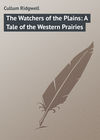Loe raamatut: «The Way of the Strong», lehekülg 29
CHAPTER XIV
THE STRIKE
Angus looked up into the faces of the three men standing beyond his roll-top desk, which was littered with dust and debris such as no man accustomed to office work could have tolerated. But Angus was no office man. He hated the place, and only used it when his work obliged him to.
Just now he was glad of it. He was glad of its support in dealing with affairs such as were confronting him at the moment. It helped him to an air which he felt to be necessary. Full well he knew the awe of a roll-top desk for these sons of the soil.
Now he leaned back in his chair, and his cold eyes glanced deliberately at each man's face in turn. They were russet-hued faces, bearded and unkempt. They were the faces of men strong in muscle if simple of mind. They were three of his farm hands, and each one had served under his guidance for many years. They were competent, skilled machinists, whose thought was only for their work and their weekly wage.
Angus knew them well, for willing, hard-working men, with a weakness only for taking things easy on Monday mornings, and an invincible desire to reach the Russell Hotel bar punctually at one o'clock on Saturday afternoons.
Secretly he regretted the interview; outwardly he was roughly indifferent.
The men stood silent and uncomfortable under his scrutiny, but a surly truculence was in their eyes as they endeavored to return his stare.
"So this is your – ultimatum," the manager said at last, with something of his best snarling grouch in his harsh voice. "Mr. Hendrie's got to cut out one hundred and eighty-three niggers from this place, all slap-up workers, who don't break up every blamed machine they put their hands on, because you white boys are kicking at their color." One of the men made a movement as though about to interrupt, but Angus silenced him with a gesture. "Hold on," he cried. "Guess I listened to you all you needed. I hadn't a word while you boys were gassing. Now I need to do some talk. Seein' I'm busy I'm not going to waste my time on you. So just get this, and get it good and quick. I'm running this layout. I'm paying you your wages. I'm boss. I'll run the place as I see fit. If you don't like it you can go – to hell!"
"They're undercuttin' us in price," cried one of the men, with an oath.
"They're being paid the same wages as you are – according to their class of work," retorted Angus sharply.
"Then they've no right to it, they're bl – niggers," cried the same man.
Angus's eyes snapped.
"I don't care a cuss if they're Red Indians or Chinamen," he snarled.
"See here, Mr. Moraine," cried another, "we come here like men to tell you what's doing, so it's up to you. We refuse to work alongside a lousy crowd o' niggers. Try and force it on us, and there's not a blamed soul among us whites'll handle a binder this harvest. Your crops can rot till they stink. Every white man on this layout quits at sun-down to-day."
Angus rose from his chair, and his lean figure was bent forward as he supported himself with one hand on the desk.
"You can take your damned 'times' now," he cried fiercely. Then he shot one hand in the direction of the door. "There's the door," he shouted. "Get to hell – through it."
The three muttering figures retreated hastily. They knew this man's methods too well to hesitate. They had been chosen by their comrades to represent them, and they had carried out their mission in good faith. But from the outset they had little enough hope of success. Men on that farm had attempted to bluff Angus before. But the hard-faced Scot was a match for any man he employed. Physically he knew no fear, and his contempt for the "hired man" was profound.
They returned to their waiting comrades filled with resentment against both Hendrie and his representative. They had done what they considered their duty, a duty pointed out to them by the talkers of their union, now they were ready to listen to any counsels, and act upon them, provided they were not of a pacific nature.
Angus dropped back into his chair, with the sigh of a man at high tension.
A moment later he picked up a tinted paper, and read the typewritten words upon it. It was a message he had received that morning from the millionaire. It was satisfactorily brief.
"Fixed up everything. Hendrie."
The sight of those three words gladdened the Scot to an extent that brought a wintry smile to his lean face. Yes, he was satisfied. He knew that the deal in wheat had been made, and that the trust affairs were safeguarded. It was this knowledge that had inspired the ruthless, autocratic fashion in which he had sent the workers' delegates about their business.
Yes, now he was rather pleased at the prospect of a fight. He would rather fight than eat. That was a phrase frequently used to express the opinion the workers held of their chief. Nor was it particularly exaggerated. This hard-driving descendant of Scotch ancestors possessed a wonderful predilection for the lesser scientific art of physical self-defense, and it was the secret of much of his success in the organizing of his employer's interests at Deep Willows.
But these developments at home left many possibilities of an ugly nature, a nature that could not easily be anticipated. With strikes here, there, and everywhere about the country, strikes of sympathy, as well as strikes for definite grievance, not even Hendrie, himself, could foresee all the possibilities of mischief. Therefore, in the millionaire's absence, it became his obvious duty to distribute a universal warning to all the trust farmers.
This was no small task, but it was one that afforded him a sort of malicious satisfaction in the thought of beating these people in the game they contemplated.
Angus quite enjoyed the work. He was really in his element. The prospect of a fight warmed his heart. Almost in the same breath he blessed and cursed what he characterized as Hendrie's bull-headed obstinacy. At one moment he was fiendishly chuckling at the headlong retreat of the invaders of his office, and the next he was swearing under his breath at the man who invented pens, and such a depressing hued liquid as ink. He was wound up to his best fighting mood, and his disappointment would be keen if the immediate future afforded no further outlet for his violent spirit.
At last his task was completed, and he sighed his relief. It was well past his dinner hour when the last message was written and dispatched to the telegraph office at Everton. But food was just now of no sort of consequence. He sat back in his chair, lit his pipe, and prepared to compose a message to his employer.
After considerable thought, and several written attempts, he completed the message. But it was not altogether satisfactory. For some moments he sat considering it, and, in the midst of his cogitations, his eye lit upon his unfolded copy of the Winnipeg Daily Times.
It was lying on the top of his desk. He always received the paper a day late, but it was his custom to read it every morning, immediately after his breakfast. This morning it had lain in its place neglected by reason of the coming of the delegation from the farm workers. Now he picked it up without another thought. His interest in the world's finance was far too deep to permit of any further neglect.
He turned the financial page and scanned it eagerly. Then, his appetite in this direction appeased, he idly turned over to the general news.
In a moment he was sitting up alert. In a moment all thoughts of finance, and everything else, were banished from his mind, and his whole interest became absorbed in what he read. The top headline was in vast type, and half a column was devoted to lesser "scare" headlines.
GENERAL RAILROAD STRIKE
THROUGHOUT THE COUNTRY
With hungry eyes he read down the list of inconveniences and terrors by which, the paper informed the public, they were beset. Then below this he read on into the lesser type, and found the filling out of the "scare" headings in picturesque, not to say lurid, journalese. This was all for the unsophisticated, the simple, and warned them that the bubble of civilization had burst as effectually as if it had been made of soap.
Angus read it all, and it impressed him. Not, perhaps, as the editor intended, but his keen mind saw through the embellishments and detected the painful truth of the facts underneath. The possibilities were enormous. He pictured the state of chaos he and Hendrie had so often discussed, which might occur in a vast country, such as Canada, with a simple trunk route of communication running through it.
Further, his mind flew to the coming of the harvest. It was less than two weeks off. In a moment the possibilities piled up in his mind till he began to think that perhaps the picturesque journalist was right, a great and terrible national disaster was upon the country.
In the midst of it all he suddenly remembered his message to Hendrie. It was a request for him to return without delay. The memory of it made him promptly turn to the paragraph relating to passenger transport. It was brief, but very definite.
"The strikers hold the track from the Atlantic Ocean to the Pacific, and it is understood that if the railroad company attempts to transport either passengers or freight, under military escort, at a given signal the permanent way will be torn up at hundreds of different points all along the line. Thus, even the mails will be held up. The intention of the strikers is to paralyze the entire trade of the country, and, since the numbers of police and troops in the country are utterly inadequate to protect the thousands of miles of permanent way, it seems more than likely the strikers' orders will have to be implicitly obeyed, or a reign of anarchy will set in. It seems impossible to believe that here in the twentieth century," etc., etc.
Angus looked from the paper at his message to Alexander Hendrie, and his pursed lips emitted a low whistle.
"It looks like – "
He was muttering to himself of the impossibility of the millionaire's return, when the door communicating with the house was unceremoniously flung open, and Phyllis hurried in.
"Mr. Moraine," she cried, a little breathlessly, holding out a telegraph slip. "I want you to get this off at once. I don't want to send it by any of the house servants. It's to Mr. Hendrie. He – he – must come back at once."
Angus scowled. He eyed the paper and finally took it from her hand in no very friendly manner. If there was one thing he hated on earth it was for women to mix themselves up with affairs.
He began to read the message, but Phyllis gave him no time to finish it. She was as near despair as ever she had been in all her young life.
"He must get right back," she declared passionately. "It's – it's – Mrs. Hendrie. I've just left Doctor Fraser." Suddenly tears leaped into her distressed eyes. "He says – if – if we are to save her she'll need to be – be operated on right away. Oh, it's awful! You – you must just get him back, and he must bring a – specialist with him. Ah – what?"
Angus pointed at the newspaper. Its headlines were staring up from the desk in all their painful crudity.
"See that?" he demanded, in his sharp way. Then he picked the paper up, and held it out to her. "Read it. There." He pointed at the paragraph relating to the transport of passengers. "I don't just see how he's to get back here with a doctor or anything else. He's wanted right here for other things, too, but – "
"Other things?"
The man nodded.
"We'll have a strike here of our own – to-night. All hands. Over three hundred of 'em."
But the girl was devouring the news. As she read, her heart sank, and all hope was completely dashed. The threatening tears overflowed down her cheeks. For the first time in her life she felt utterly helpless.
"But he must, he must, he must come?" she cried desperately. "Don't you understand? It means Mrs. Hendrie's life if he doesn't bring help. Oh, don't sit there staring. Do something. You – you've got to get him here, somehow – with a – a surgeon. Strike? Do you think we can let strikes stand in the way – when her life depends on it? Let him come by 'special' – anything so we get him here. Oh!"
Her hands flung together in an impotent gesture of desperation with her final exclamation, and even the cold heart of the manager was moved.
He leaned forward in his seat.
"Easy, girl," he cried. "You're talking foolish. You got to keep cool, and we'll think this thing out. I guess Mrs. Hendrie's turn was sudden," he said thoughtfully. "And the Doc's let her run to the last before he guessed how things were. It's their way – some of 'em. How long's she got? You see, Hendrie's hung up – same as other folks. It's no use talking of 'specials,' but the wire's still open. Now, see here, if we've got time, maybe he can make it in an automobile. It's up to him, and I don't guess much'll stop him when he knows how things are. You find out what time the Doc gives her, and I'll wire. You see, sometimes these things – What's that?"
Angus held up a hand and sat listening.
Far away it seemed, a low, soft note droned in through the open window. It was a deep, purring sound like the hum of the wind in overhead telegraph wires.
Suddenly the man sprang from his seat. He went to the outer door and flung it open. The girl followed, and stood beside him. The sound grew louder. At last the man turned. His excitement had given place to his usual taciturn expression. He shook his head ominously.
"That's Hendrie's automobile," he said. "If he's in it – there's a hell of a poor chance of getting a surgeon from Winnipeg."
But Phyllis made no answer. She was staring out down the trail, watching, watching for the coming of the vehicle, in the hope that Hendrie was not with it.
The moment passed. Then all of a sudden she cried out, and stood with outstretched arm pointing.
"Look," she cried. "Look, look! It is – Mr. Hendrie."
A few moments later the great machine rolled up. The millionaire, at sight of Angus and Phyllis, signed to the driver, and, instead of going on to the front of the house, the machine drew up at the office door. He leaped to the ground and came over to them at once.
"I just made it," he cried. "Got the last train out of Winnipeg. They've closed down tighter than hell. There's not a locomotive running in the country to-day – except to carry mails. Just the loco and caboose – that's all. I was dead in luck. Inside information put me wise. Say – there's going to be the devil to pay."
"There sure is," replied Angus grimly. "Say, just come right in. There's things – doing."
Hendrie glanced sharply into the man's face. Then his eyes turned quickly upon Phyllis. But he followed his manager into the office without a word.
Inside Angus pushed a chair forward for the millionaire's accommodation. But the latter made no attempt to use it.
"Well?" he demanded, looking from one to the other. "What's – doing?"
Angus shrugged and picked up the message he had written out. He handed it to him.
"Guess that'll tell you – quickest," he said.
The millionaire took the paper. As he read the long message it contained, his eyes lit, and a half smile stirred the corners of his mouth.
Finally he looked up into the Scot's face.
"Well?" he said. "We've guessed that all along. That's not worrying any of us. You got my message? The deal's through. Every grain of wheat on Deep Willows is sold in the ear. I've sold no more, but I stand a personal guarantee for the rest. You see, I've a notion that the risk lies in my property – only. Nowhere else. My guarantee for the rest of the trust farmers, which includes your property, goes. The trust must get the full benefit of the market. This is its first year of operation, and I want to show a good result. Strike or no strike, we've got them beaten to a mush. The trust just gets to work as per schedule. Say, they can't hurt us a thing. Even this railroad strike can't seriously interfere. All it will do, if it only lasts long enough, is to send up the price of the crop. That's not going to worry us a little – "
At that moment Phyllis, unable to contain herself longer, made a move towards the millionaire. Angus saw the movement, and Hendrie became aware of it as his manager's eyes were turned upon the girl.
"Ah, my dear," he cried, still buoyant in his confidence, "guess I'd forgotten you. Eh?"
Phyllis was holding up her message. The message she had brought for Angus to dispatch.
"What, more trouble?" cried Hendrie, taking the paper with a laugh.
Phyllis made no answer. She felt sick at heart. Her unaccustomed eyes had not yet adjusted their focus to matters involving life and death. Besides, since she had first encountered Monica upon the trail, a great affection had steadily grown up in her heart for the woman, who, later, she had learned, was the woman whom Frank had always regarded as his mother. Now, to her inexperienced mind, there seemed to be no hope for her, whichever way she looked. She was pinning her faith to this man whose strength and dominating force alone seemed possible in such an emergency. She waited, scarcely daring to breathe, watching for that ray of hope she dared to think his expression as he read might afford her.
But her hopes fell completely, still further below the zero at which they had stood. First, as she watched, she saw that ominous drawing together of the man's heavy brows, then, the naturally cold gray of his eyes seemed to change. Their stony gleam shone like the pinnacles of an iceberg in the light of a winter sun. Then they lit with a sudden violent emotion, and it seemed to her that the strength she was relying upon was about to fail her.
He looked up from the paper which fluttered to the floor from fingers which no longer seemed to obey the controlling will. He looked at Angus for a moment in a sort of dazed inquiry. Then his gaze sought the girl, and the storm burst.
"God in heaven!" he cried.
It was the exclamation of a mind which scarcely grasps the reality of the position, and yet has received the full shock.
"Why was I not told?" he demanded fiercely. "Why, in God's name, was it left till now? You Angus! You girl!" He turned furiously from one to the other. "Do you know what you've done? Do you?" He laughed wildly. "Of course you do? You've timed it. Timed it, do you hear? So it's impossible to get poor Mon the help she needs. Oh, as if I can't see. Am I blind? Am I an imbecile? You, you rotten Scot, you've always hated her. I saw it from the first. And now maybe you're satisfied. As for you, girl" – he turned upon Phyllis with upraised arms, as though about to strike her to the ground – "you're as bad. You wanted your revenge for what your man has been made to suffer. That's it. Oh, God, that I should have been so blind! Was there ever such a devilish vengeance? You, with your mild ways and simple air, you've stolen into my house that you might break my heart to square with me for your man's sufferings. And between you my Monica, my poor Mon, is lying in extremity, waiting for the help you would deny her. You thought to hurt me, and by God! you have succeeded," he cried, his voice rising to greater violence. "Oh, yes, you've succeeded, between you. You've done more. You've – you've killed her!"
He brought one great fist crashing down upon the desk. Then he rushed on —
"That fool doctor talks of hope. How can there be hope? I tell you there's none – not a shadow. There's not a train to go through. North, South, East and West, we are cut off as if those cursed plains were an ocean. Hope?" he laughed harshly. "There's as much hope as there is in hell. That woman'll be left to die. Do you hear me? Die! And between you, some of you, you've killed her!"
His frenzy was the frenzy of a madman. It was a frenzy such as, once before in his life, he had displayed. All this man's strength was swept aside by the passionate torrent of his dreadful feelings. All power of reason was lost to him. No hysterical child could have been weaker in its mental balance than this great savage man was at that moment.
Phyllis understood something of this. Angus simply eyed him watchfully. His was not the discerning eye of the girl. His attitude was the outcome of a nature which understood violence only at its face value, therefore he was physically and mentally alert. But the girl, a mere child, saw deeper. And her observation roused her own latent courage and mentality to activity.
She saw that she must fling herself into the arena that he might be brought up to the only fighting pitch that could serve them all, that could serve Monica. She seized upon his final charge to attack him almost as fiercely as he had attacked them.
"You are talking like a child," she cried recklessly. "You're talking out of a yellow strain that lies somewhere in your own wicked heart. How dare you say such things to us – to me? It's you – you who've laid poor Monica on her bed of sickness. You, with your cruel wickedness. Your vile suspicions. It is you, alone, who's responsible, and you know it.
"Say, Mr. Hendrie," she went on, her tone changing from passionate anger to one of taunting mockery. "You're a great man. There's no one can beat you when they get up against you. That's why you can stand there bullying and accusing us. You think to crush us right into the dust, like – like slimy reptiles. Oh, you're a great man. You're so strong."
Then, in a flash, her mockery was merged into a fierce challenge, the more strong for her very youth and girlishness.
"Prove it! Prove it!" she cried. "Prove your power against the fate barring your way. Don't stand there accusing folks who're right here to help you all they know. Save your Monica. There's time – yes, I tell you there's time – if you've the heart and courage to do it!"
She stood before him, her slim figure palpitating with the fierce emotion his madness had stirred in her. Her dark eyes flashed into his with all the courage of her young heart shining in their depths. And before it the man's insane frenzy died abruptly.
Angus, watching, beheld this girl's – this child's – victory. His cool Scotch brain marveled, and reluctantly admired, while he waited for the millionaire's reply.
It came after a long pause. It came in the hard, cold tones to which he was used, when stress of affairs demanded the concentrated force which lay behind his methods.
"Run away, girl," he cried harshly. "Run away, and leave me to think this thing out. Guess I'm sorry for what I said – Now I just want to think."




















